7+ Sample Housekeeping Evaluation
-
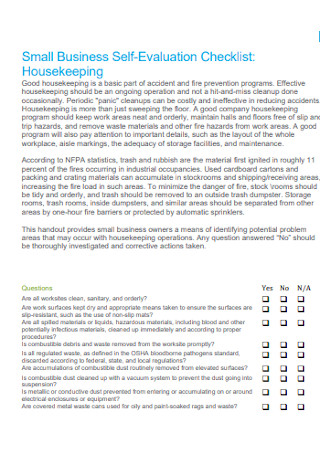
Housekeeping Evaluation Checklist
download now -
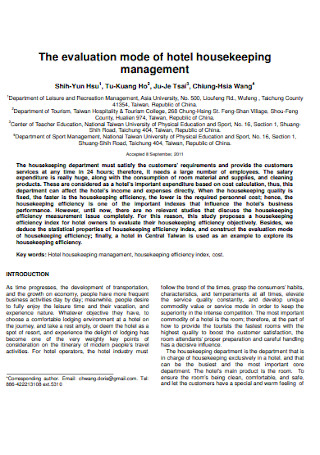
Hotel Housekeeping Evaluation
download now -

Simple Housekeeping Evaluation
download now -
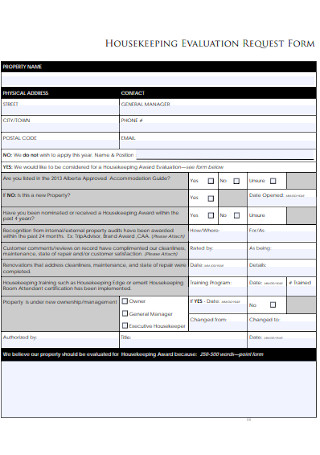
Housekeeping Evaluation Request Form
download now -
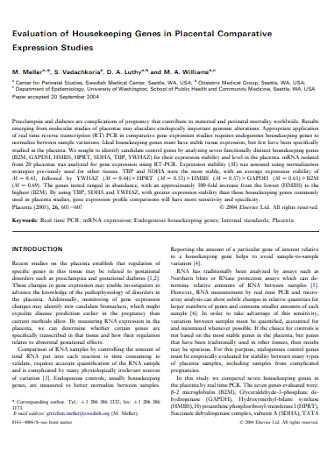
Evaluation of Housekeeping Template
download now -
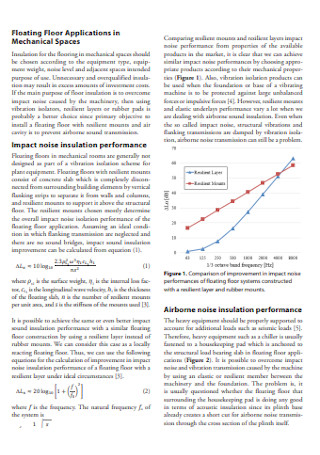
Floors Housekeeping Evaluation
download now -

Housekeeping Evaluation Format
download now -

Formal Housekeeping Evaluation
download now
FREE Housekeeping Evaluation s to Download
7+ Sample Housekeeping Evaluation
What Is a Housekeeping?
Benefits of Housekeeping in the Workplace
Types of Housekeeping Skills
Tips for Choosing the Best Cleaning Services
How to Hire the Best Housekeeping
FAQs
How does proper housekeeping increase safety?
What is the significance of Good Housekeeping in the workplace?
How can I be a good housekeeping supervisor?
What Is a Housekeeping?
The management of domestic responsibilities, such as cleaning, cooking, home maintenance, shopping, and bill paying, is referred to as housekeeping. These tasks may be undertaken by household members or by individuals hired for the purpose. Statistics indicate that approximately 10 percent of U.S. families hire a professional cleaning service.
Benefits of Housekeeping in the Workplace
Many businesses and organizations rely on a clean and orderly work environment to aid their development and growth. Suppose a firm wishes to increase the efficiency and productivity of its employees. In that case, it can be beneficial to grasp the advantages of a clean and organized workplace and how to attain them. Here are some significant benefits of maintaining a clean and organized workplace:
Types of Housekeeping Skills
Housekeeping skills are necessary for a housekeeper to be successful in their profession. Depending on the housekeeper’s job and workplace, these abilities range from customer service to attention to detail. For instance, a hospital cleaner may be required to adhere to tight cleanliness regulations to ensure that patients are in a clean and healthy environment. On the other hand, a personal housekeeper may handle delicate cleaning tasks such as dusting and vacuuming. However, regardless of the duties and location of a housekeeper, they must acquire various housekeeping skills to be effective in their position. Below are seven abilities often possessed by professional housekeepers:
Tips for Choosing the Best Cleaning Services
When exploring the best house cleaning service, it is easy to become overwhelmed by the amount of available information. Sifting through websites, obtaining bids, and communicating with each service could take days or weeks. You may still be uncertain whether you are maximizing your investment. You will discover what to look for in a trustworthy house cleaning service, the optimal booking times, and how to save money on cleaning services. If you’ve never booked a housecleaning service or are on the market for a new one, read this before making any reservations.
1. Lessen the scope
What do you need assistance with the most? Since not all cleaning services offer the same services, it is essential first to take stock of the objects you want to be cleaned. For instance, some companies clean your laundry, make your beds, wash your dishes, etc., so it’s vital to know what you need before booking that the business you employ performs these services. Don’t make any assumptions. Nothing is worse than expecting your laundry to be folded when you return home, only to discover that it was not done because it was not part of their service agreement with you. Second, if you’re on a budget, you may tailor your cleaning to make it a little cheaper by determining what you genuinely need to be cleaned. Keep in mind, however, that not all cleaning services permit this. Also, you can reduce the number of monthly appointments. Therefore, biweekly appointments may suffice instead of weekly meetings. Or, if you do not have children, monthly visits may be enough, although some adults are messier than most 5-year-olds.
2. Appointments should be frequent
Need monthly, bi-weekly, or weekly cleaning services? Or perhaps a one-time cleaning before moving out? Examine with great care the frequency of your house cleaning needs. Maybe you can get away with biweekly cleanings as opposed to weekly ones. Keep in mind that the more regular your appointments are, the lower the cost of each visit. For instance, biweekly cleanings are less expensive each visit than monthly cleanings, which can cost a few dollars more per month. Alternatively, you may start with a weekly cleaning schedule and alter it later if you feel you don’t need it as often, or you might start with a monthly cleaning schedule and increase the frequency if necessary. Due to the intensity of the cleaning and the fact that it is not a recurring service, move-outs, and one-time appointments will nearly always incur the highest per-visit rate.
3. Check reviews or ask friends
Asking friends, relatives, and coworkers who have already hired a house cleaning service for a suggestion can save you a terrific offer of time and effort since you can assume that if they had a positive experience, you will also. In some situations, if you use a cleaning service suggested to you, you will receive a referral credit, and the person who recommended you will receive a credit. It’s a win-win situation for you both. If you don’t have anybody to ask or want to conduct your research, reading a company’s customer evaluations can provide insight into what you can expect.
4. Flat-rate pricing and tours
Do you know the cleaning estimate is $100 less than the rest? Yes, it sounds excellent, but you should double-check to see if it is a flat charge. Most likely, it is not, and they have badly underestimated the job. A fixed cost is more constant and ensures that you know what you’re paying for and aren’t surprised by the final price, as neither the efficiency nor the effort of the maids can be predicted.
5. Seek a superior cleaning experience
Each option has pros and downsides, and these variances result in vastly different experiences. From online customer support chat to scheduling and appointment reminders, we utilize technology to enhance your customer experience. We don’t try to deceive you with “man-hours” or bill you for cleaning add-ons you don’t require.
How to Hire the Best Housekeeping
The last thing you like to do after a long day of work and taking care of the kids is clean the kitchen or toilet. So why not just pay someone to do it? Follow these expert tips to find a house cleaner in your area that you won’t want to live without.
1. Know where to look
Look for someone with experience receptive to direction and feedback when hiring a housekeeper for the first time. Because the cleaner will be in your house, it is essential to find a trustworthy individual. You should also confirm that the cleaner’s timetable is compatible with yours; they shouldn’t arrive during family dinner or when you attend your book organization.
2. Obtain referrals and read opinions
Request referral forms from friends, family, neighbors, and coworkers. You can also utilize websites to research consumer testimonials. Talk to at least three different house cleaning firms or individual cleaners to choose who will best suit your home and needs.
3. Interview the service or cleaner
Ideally, it will help if you speak with the person who will clean your home. With larger cleaning businesses, you will likely talk with a representative who handles new clients. Prepare a list of questions to ask a house cleaning regardless of the path you select. How many years of cleaning background do you have? Who is liable for the supply of cleaning materials? What types of cleaning materials are employed?
4. Request a background check and verify assets
Your housekeeper will have access to your private area near your family, so be sure they are trustworthy and dependable. Inquire whether the cleaning service does background checks on its personnel and maintains liability insurance. If possible, the agreement should be in writing and include specifics about obligations such as property damage and on-site injury. In most instances, a specialized license is not required to become a domestic housekeeper.
5. Define your agreement
Once you have chosen a cleaning service, describe the terms of your agreement. Determine the frequency of their visits, the services or hours provided, and the cost. Include a list of the rooms, floors, and items to be cleaned. Discuss any unique aspects of your home, such as treasured dishes to dust or new flooring that requires special care. Take a home tour and note any specifics you wish to convey to your cleaner. You may desire to specify this in a contract if you’re working with a cleaning service. You may feel comfortable without an explicit agreement if the cleaner is an individual. Most maid services require a couple of weeks’ notice before their initial visit, so book their services as soon as you need assistance with cleaning and organizing around the holidays.
6. Know their responsibilities and yours
You want your house cleaners to be able to focus on cleaning surfaces and spaces, not rearranging your belongings or clearing your kitchen counter when they arrive. Knowing what to do before your house cleaner’s arrival allows you to maximize their time and assure their comfort.
FAQs
How does proper housekeeping increase safety?
Good housekeeping helps prevent injuries and boosts workplace productivity and morale. According to the article Benefits of Proper Housekeeping Practices published by websites, good housekeeping is more than just cleanliness; it also provides the groundwork for accident and fire avoidance.
What is the significance of Good Housekeeping in the workplace?
Good housekeeping prevents illnesses and injuries and encourages beneficial behaviors, habits, and attitudes. According to the Occupational Safety and Health Administration, a successful housekeeping program is vital to workplace safety and health management systems.
How can I be a good housekeeping supervisor?
The Housekeeping Supervisor is responsible for planning staff shifts, teaching, and motivating team members, and inspecting the cleanliness of private and public locations. To succeed in this part, you must have a solid grasp of sanitation rules and team leadership skills.
Maintaining high standards for your housekeeping team will give them the discipline to improve their services each time. When employees perform well, house managers must recognize their efforts with incentives and praise. This might raise the staff’s morale and encourage them to maintain quality. To assist you in creating your housekeeping evaluation, feel free to grab our free template examples. They are free to download and printable as well!
